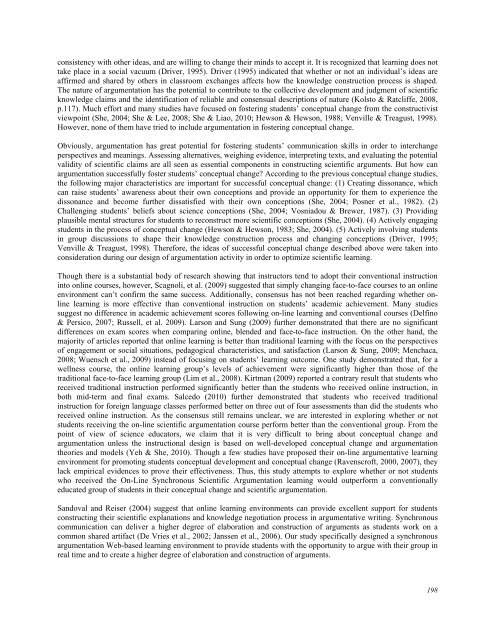January 2012 Volume 15 Number 1 - Educational Technology ...
January 2012 Volume 15 Number 1 - Educational Technology ...
January 2012 Volume 15 Number 1 - Educational Technology ...
You also want an ePaper? Increase the reach of your titles
YUMPU automatically turns print PDFs into web optimized ePapers that Google loves.
consistency with other ideas, and are willing to change their minds to accept it. It is recognized that learning does not<br />
take place in a social vacuum (Driver, 1995). Driver (1995) indicated that whether or not an individual’s ideas are<br />
affirmed and shared by others in classroom exchanges affects how the knowledge construction process is shaped.<br />
The nature of argumentation has the potential to contribute to the collective development and judgment of scientific<br />
knowledge claims and the identification of reliable and consensual descriptions of nature (Kolsto & Ratcliffe, 2008,<br />
p.117). Much effort and many studies have focused on fostering students’ conceptual change from the constructivist<br />
viewpoint (She, 2004; She & Lee, 2008; She & Liao, 2010; Hewson & Hewson, 1988; Venville & Treagust, 1998).<br />
However, none of them have tried to include argumentation in fostering conceptual change.<br />
Obviously, argumentation has great potential for fostering students’ communication skills in order to interchange<br />
perspectives and meanings. Assessing alternatives, weighing evidence, interpreting texts, and evaluating the potential<br />
validity of scientific claims are all seen as essential components in constructing scientific arguments. But how can<br />
argumentation successfully foster students’ conceptual change? According to the previous conceptual change studies,<br />
the following major characteristics are important for successful conceptual change: (1) Creating dissonance, which<br />
can raise students’ awareness about their own conceptions and provide an opportunity for them to experience the<br />
dissonance and become further dissatisfied with their own conceptions (She, 2004; Posner et al., 1982). (2)<br />
Challenging students’ beliefs about science conceptions (She, 2004; Vosniadou & Brewer, 1987). (3) Providing<br />
plausible mental structures for students to reconstruct more scientific conceptions (She, 2004). (4) Actively engaging<br />
students in the process of conceptual change (Hewson & Hewson, 1983; She, 2004). (5) Actively involving students<br />
in group discussions to shape their knowledge construction process and changing conceptions (Driver, 1995;<br />
Venville & Treagust, 1998). Therefore, the ideas of successful conceptual change described above were taken into<br />
consideration during our design of argumentation activity in order to optimize scientific learning.<br />
Though there is a substantial body of research showing that instructors tend to adopt their conventional instruction<br />
into online courses, however, Scagnoli, et al. (2009) suggested that simply changing face-to-face courses to an online<br />
environment can’t confirm the same success. Additionally, consensus has not been reached regarding whether online<br />
learning is more effective than conventional instruction on students’ academic achievement. Many studies<br />
suggest no difference in academic achievement scores following on-line learning and conventional courses (Delfino<br />
& Persico, 2007; Russell, et al. 2009). Larson and Sung (2009) further demonstrated that there are no significant<br />
differences on exam scores when comparing online, blended and face-to-face instruction. On the other hand, the<br />
majority of articles reported that online learning is better than traditional learning with the focus on the perspectives<br />
of engagement or social situations, pedagogical characteristics, and satisfaction (Larson & Sung, 2009; Menchaca,<br />
2008; Wuensch et al., 2009) instead of focusing on students’ learning outcome. One study demonstrated that, for a<br />
wellness course, the online learning group’s levels of achievement were significantly higher than those of the<br />
traditional face-to-face learning group (Lim et al., 2008). Kirtman (2009) reported a contrary result that students who<br />
received traditional instruction performed significantly better than the students who received online instruction, in<br />
both mid-term and final exams. Salcedo (2010) further demonstrated that students who received traditional<br />
instruction for foreign language classes performed better on three out of four assessments than did the students who<br />
received online instruction. As the consensus still remains unclear, we are interested in exploring whether or not<br />
students receiving the on-line scientific argumentation course perform better than the conventional group. From the<br />
point of view of science educators, we claim that it is very difficult to bring about conceptual change and<br />
argumentation unless the instructional design is based on well-developed conceptual change and argumentation<br />
theories and models (Yeh & She, 2010). Though a few studies have proposed their on-line argumentative learning<br />
environment for promoting students conceptual development and conceptual change (Ravenscroft, 2000, 2007), they<br />
lack empirical evidences to prove their effectiveness. Thus, this study attempts to explore whether or not students<br />
who received the On-Line Synchronous Scientific Argumentation learning would outperform a conventionally<br />
educated group of students in their conceptual change and scientific argumentation.<br />
Sandoval and Reiser (2004) suggest that online learning environments can provide excellent support for students<br />
constructing their scientific explanations and knowledge negotiation process in argumentative writing. Synchronous<br />
communication can deliver a higher degree of elaboration and construction of arguments as students work on a<br />
common shared artifact (De Vries et al., 2002; Janssen et al., 2006). Our study specifically designed a synchronous<br />
argumentation Web-based learning environment to provide students with the opportunity to argue with their group in<br />
real time and to create a higher degree of elaboration and construction of arguments.<br />
198

















